-- Published: Wednesday, 6 September 2017 | Print | Disqus
By Frank Holmes
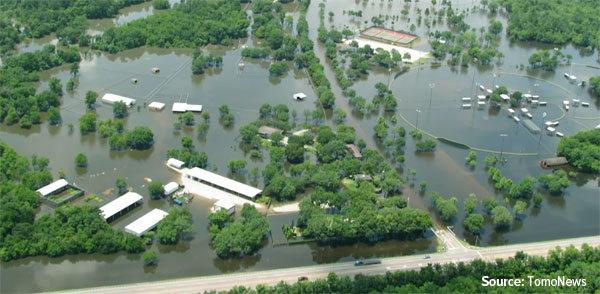
Unless youíve been away from a TV, computer or smartphone for the past week, youíve likely seen scores of pictures and videos of the unprecedented devastation that Hurricane Harvey has brought to South Texas and Louisiana. As a Texan by way of Canada, Iíd like to take a moment to reflect on the human and economic impact of this storm, one of the worst natural disasters to strike the U.S. in recorded history.
Below are some key data points and estimates that help contextualize the severity of Harvey and its aftermath.
$503 Billion
In a previous Frank Talk, ď11 Reasons Why Everyone Wants to Move to Texas,Ē I shared with you that the Lone Star State would be the 12th-largest economy in the world if it were its own countryówhich it initially was before joining the Union in 1845. Following California, itís the second-largest economy in the U.S. A huge contributor to the state economy is the Houston-Woodlands-Sugar Land area, which had a gross domestic product (GDP) of $503 billion in 2015, according to the U.S. Bureau of Economic Analysis. Not only does this make it the fourth-largest metropolitan area by GDP in the U.S., but its economy is equivalent to that of Sweden, which had a GDP of $511 billion in 2016.
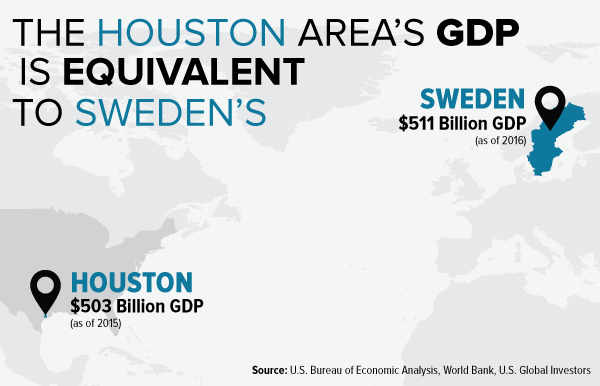
1-in-1,000 Years
The amount of rain that was dumped on parts of Southeast Texas set a new record of 51.88 inches, breaking the former record of 48 inches set in 1978. But now we believe it exceeds that of any other flood event in the continental U.S. of the past 1,000 years. Thatís according to a new analysis by the Cooperative Institute for Meteorological Satellite Studies and Dr. Shane Hubbard, a researcher with the University of Wisconsin-Madison. Hubbardís conclusion required the use of statistical metrics since rainfall and flood data go back only 100 years or so, but the visual below might help give you a better idea of just how rare and exceptional Harvey really is.
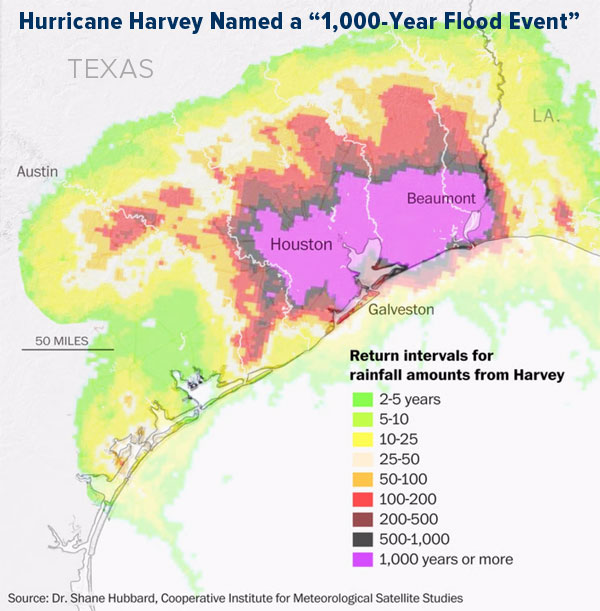
$190 Billion
According to one estimate, Hurricane Harvey could end up being the costliest natural disaster in U.S. history. Analysts with Risk Management Solutions (RMS) believe economic losses could run between $70 billion and $90 billion, with a majority of the losses due to uninsured property. This is a conservative estimate compared to AccuWeather, which sees costs running as high as $190 billion, or the combined dollar amounts of Hurricanes Katrina and Sandy. If so, this would represent a negative 1 percent impact on the nationís economy.
500,000 Cars and Trucks
The wind and rains damaged more than just houses, schools, refineries and factories. According to Cox Automotive, which controls Kelley Blue Book, Autotrader.com and other automotive businesses, as many as half a million cars and trucks could have been rendered inoperable because of the flooding. That figureís double the number of vehicles that were destroyed during Hurricane Sandy in 2012. What this means, of course, is that auto dealerships are going to have their work cut out for them once the waters recede and insurers start cutting some checks. Buyers can likely expect to see a huge premium on used cars.
24%
Most people know that Texas is oil country. What they might not know is that itís also the nationís number one gasoline-producing state, accounting for nearly a quarter of U.S. output, as of August. In addition, the Lone Star State leads the nation in wind-powered generation capacity, natural gas production and lignite coal production, according to the Energy Information Administration (EIA).
600,000 Barrels a Day
The largest oil refinery in the U.S. belongs to Motiva Enterprises, wholly controlled by Saudi Aramco, the biggest energy company in the world. Located in Port Arthur, about 110 miles east of Houston, Motiva is capable of refining up to 603,000 barrels of crude a day. As floodwaters gradually filled the facility, the decision was made last Wednesday to shut it down completely, and as of Friday morning, there was no official timetable as to when operations might begin again, according to the Houston Business Journal. The consequences will likely reverberate throughout the energy sector for some time.

click to enlarge
Motiva isnít the only refinery that was affected, of course. As much as 31 percent of total U.S. refining capacity has either been taken offline or reduced dramatically because of Harvey, according to CNBC. The Houston area alone, known as the energy capital of the world, is capable of refining about 2.7 million barrels of crude a day, or 14 percent of the nationís capacity.
$2.50 a Gallon
As of last Friday morning, gas prices in Texas had surged to $2.33 a gallon on average, more than a two-year high, according to GasBuddy.com. In the Dallas-Ft. Worth area, prices at some pumps are reportedly near $5 a gallon. By Monday, prices had spiked even more, to $2.50 a gallon.
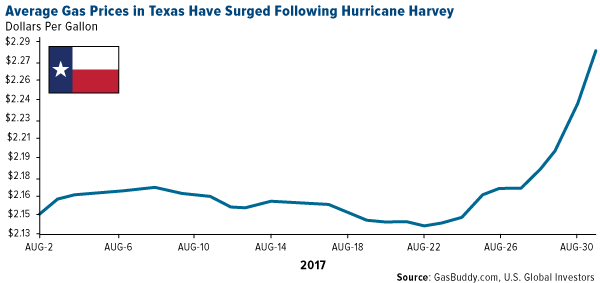
click to enlarge
With concerns that a gas shortage might hit the state, panicked Texas consumers lined up outside numerous stations, sometimes for miles, to drain them dry. By 5:00 on Thursday, the 7-Eleven next door to U.S. Global headquarters was serving diesel only.
54 Million Passengers
The Houston Airport System is one of the busiest in the world, with the total number of passengers enplaned and deplaned standing at roughly 54 million, as of April 2017. Flights at the cityís two largest airports, Bush Intercontinental and Hobby, were suspended Sunday, September 27, with more than 900 passengers stranded between the two. Commercial traffic resumed on Wednesday, though service was limited. According to Bloomberg, United Airlines, which has a major hub at Bush Intercontinental, was scheduling only three arrivals and three departures a day.
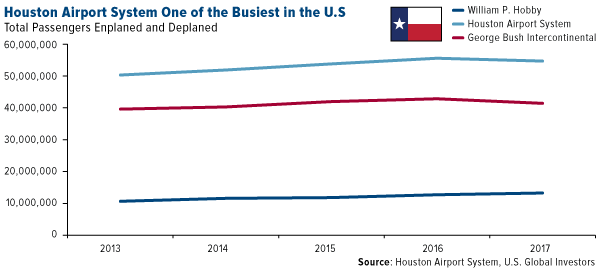
click to enlarge
The International Business Times reports that several major airlines are offering frequent flyer miles in exchange for donations to Hurricane Harvey disaster relief. American Airlines, for example, will provide 10 miles for every dollar donated to the American Red Cross after a minimum $25 contribution. Other carriers have similar programs, including United, Delta Air Lines, Southwest Airlines and JetBlue Airways.
The Kindness of Strangers
For all the talk of economic impact and barrels of oil, itís important we keep in mind that Hurricane Harvey has had real consequences on individuals, families and businesses. Many of them have lost everything.
I might not have been born in the U.S., but Iíve always been moved and inspired by how selflessly Americans rally together and rush to each otherís aid in times of dire need.
This, of course, is one of those times, and I urge everyone reading this to consider donating to a reputable charity of your choice. For our part, U.S. Global Investors will be donating money, food, clothing and other necessities to one of our favorite local charities, the San Antonio Food Bank.
Please keep the people of South Texas and Louisiana in your thoughts and prayers!
http://www.usfunds.com/
All opinions expressed and data provided are subject to change without notice. Some of these opinions may not be appropriate to every investor. By clicking the link(s) above, you will be directed to a third-party website(s). U.S. Global Investors does not endorse all information supplied by this/these website(s) and is not responsible for its/their content.
Holdings may change daily. Holdings are reported as of the most recent quarter-end. The following securities mentioned in the article were held by one or more accounts managed by U.S. Global Investors as of 6/30/2017: American Airlines Group Inc., Delta Air Lines Inc., United Continental Holdings Inc., Southwest Airlines Co., JetBlue Airways Corp.
| Digg This Article
-- Published: Wednesday, 6 September 2017 | E-Mail | Print | Source: GoldSeek.com

